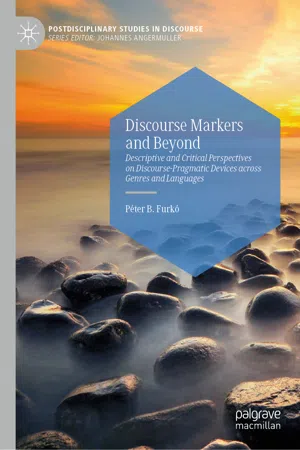1 Theoretical and Empirical Approaches to Discourse Markers
The present volume is informed by research in a sub-field of pragmatics, discourse marker research, often considered a “growth industry” (Fraser 1999: 931) and, at the same time, a “testing ground” (Bordería 2008: 1354) for pragmatic theories.
Discourse markers comprise a functional class of linguistic items that do not typically change the propositional meaning of an utterance but are essential for the organization and structuring of discourse, for marking the speaker’s attitudes to the proposition being expressed as well as for facilitating processes of pragmatic inferences. A variety of approaches and definitions have been offered, each one informed by a particular theoretical framework (Conversation Analysis, Interactional Sociolinguistics, Rhetorical Structure Theory, Relevance Theory, etc., for an overview cf. Fischer 2006; Furkó 2007; Vaskó 2016; Dér 2017).
Despite the rapidly growing body of discourse marker research, experts in the field observe over and over again that there are still a number of fundamental questions that need to be answered (cf. e.g. Schourup 1999; Fraser 1999; Dér 2010, 2017; Heine 2013; Vaskó 2016). Some of the issues include the lack of generally accepted terminology and classifications and uncertainty regarding essential formal, semantic and pragmatic characteristics.
The resulting terminological turmoil is illustrated in Table
1, which provides a summary of some of the terms in classical studies and more recent analyses referring to the respective discourse uses of
well,
of course, oh, etc.:
Table 1Alternative terms for English discourse-pragmatic devices
| | well | of course | oh | ah | now | I mean | but | you know |
|---|
Schourup (1985) | DP | – | DP | DP | DP | DP | – | DP |
Schiffrin (1987) | DM | – | DM | – | DM | DM | DM | DM |
Erman (1987) | PE | – | – | – | – | PE | – | PE |
Fraser (1990) and (1999) | DM/pause marker* | DM | int/pause marker | pause marker | DM | ‘90-PM ‘99-DM | DM | PM |
James (1974) | int | – | int | int | – | – | – | – |
Wierzbicka (1991) | – | – | int | int | – | – | – | – |
Hirschberg and Litman (1993) | cue | – | – | – | cue | – | cue | – |
Stenström (1994) | DM/IS* | – | IS | – | DM/IS* | IS | – | DM/IS* |
Holmes (1995) | PP | PP | – | – | – | PP | – | PP |
Kroon (1995) | DP | – | – | – | – | DP | DP | DP |
Nikula (1996) | PFM | PFM | – | – | – | PFM | – | PFM |
Fuller (2003) | DM | DM | DM | – | – | DM | – | DM |
Beeching (2016) | PM | booster | – | – | – | PM | – | PM |
Crible (2017) | DM | – | DM | int | DM | DM | DM | DM |
The issue of terminology, alternative terms and overlapping categories such as pragmatic markers, connectives, contextualization cues and enunciative markers will be the focus of Chapter 3 of the volume, while a number of monographs (cf. Furkó 2007; Beeching 2016; Dér 2017) also provide detailed discussions of the theoretical assumptions behind the use of competing terms. Furkó (2007), in particular, takes the pragmatic marker-discourse marker dichotomy as its major theme. Dér (2017: 9) observes that the term discourse marker appears to be the most inclusive and frequently used in the English literature, while its Hungarian mirror translation “diskurzusjelölő” also appears to be the most widespread in the respective academic community (Dér 2017: 10). Accordingly, I will be using this as an umbrella term in the present introduction and make the distinction between textual (prototypically discourse) functions and (inter)subjective (prototypically pragmatic) functions prominent in subsequent chapters where relevant.
The present volume will provide a series of empirical case studies on the use of discourse markers across genres and languages as well as critical analyses of the manipulative potential of discourse markers. Therefore, the present introduction will focus on the second problem area mentioned above, i.e. the issue of categorization and category membership as well as the methods by which one can identify lexical items that are discourse markers and distinguish them from non-discourse marker uses of the source categories.
Describing the characteristics of the functional class of discourse markers and developing criteria for deciding for every given instance whether or not it is a discourse marker have been major preoccupations in recent discourse marker research. Authors usually provide exhaustive lists of the formal, functional and stylistic features that are associated with discourse markers as a functional class (cf. e.g. Schourup
1999; Fraser
1999; Beeching
2016; Brinton
2017), but empirical studies rely on different subsets of such criterial features when identifying particular instances of discourse markers in a given corpus (for a detailed discussion, cf.
Crible 2017). Naturally, this makes it difficult to compare the results of empirical research even if similar datasets are involved. Table
2 illustrates this problem.
Table 2Individual authors’ focus on categorial properties discourse markers display
| | seq. | context | oral | synt. | proced | poly-func. | attitude | scope | non-prop. | inv. |
|---|
Schiffrin (1987) | x | x | x | x | | | (x) | | | |
Fraser (1990, 1999) | x | x | | x | x | | | | x | |
R... |
